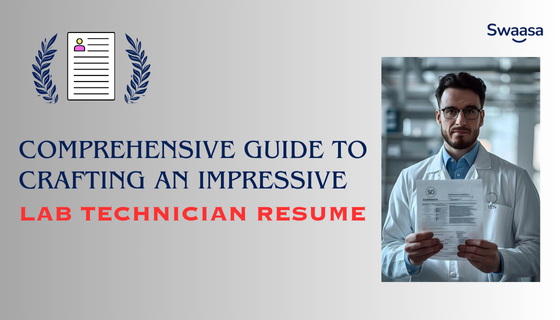
Comprehensive Guide to Crafting an Impressive Lab Technician Resume

22-Oct-2024
Comprehensive Guide to Crafting an Impressive Lab Technician Resume
Introduction
In the competitive job market, a well-structured and informative resume can set you apart from other candidates. This guide will provide you with essential insights into creating an effective lab technician resume that highlights your skills, experiences, and qualifications.
Understanding the Lab Technician Role
Before diving into resume creation, it’s crucial to understand the responsibilities of a lab technician. Lab technicians play a vital role in various industries, including healthcare, research, and manufacturing. They are responsible for:
- Conducting tests and analyses
- Maintaining laboratory equipment
- Preparing samples for testing
- Documenting results
- Ensuring compliance with safety protocols
By showcasing these responsibilities in your resume, you can demonstrate your understanding of the role and your suitability for the position.
Crafting Your Lab Technician Resume
1. Resume Format for Lab Technician
Choosing the right format is key to presenting your information clearly and professionally. Here are common resume formats suitable for lab technicians:
Resume Format Types:
Chronological: Best for candidates with a solid work history.
- Functional: Best for candidates with gaps in employment or those changing careers.
- Combination: Best for candidates who want to highlight both skills and work history.
2. Essential Sections of a Lab Technician Resume
Your resume should include the following sections:
- Contact Information: Include your name, phone number, email address, and LinkedIn profile (if applicable).
- Objective Statement: A brief statement outlining your career goals and what you bring to the position.
- Skills: A list of relevant skills that match the job description.
- Work Experience: Details of your past employment, including job title, company name, location, and dates of employment.
- Education: Your educational background, including degrees earned and institutions attended.
- Certifications: Relevant certifications or licenses related to laboratory work.
- References: Available upon request.
3. Writing an Objective Statement
The objective statement is a critical component that sets the tone for your resume. Here are some examples of effective objectives for a lab technician resume:
- “Dedicated lab technician with 3 years of experience in clinical laboratory settings, seeking to leverage expertise in diagnostics and research at [Company Name].”
- “Detail-oriented lab technician committed to delivering accurate results and maintaining high standards of safety in the laboratory environment.”
4. Highlighting Your Skills
When listing skills, focus on those that are specifically mentioned in the job description. Here’s a list of essential skills for a lab technician:
- Proficient in laboratory techniques and equipment
- Strong analytical skills
- Attention to detail
- Ability to work independently and in a team
- Knowledge of safety protocols and compliance
5. Work Experience Section
When detailing your work experience, use bullet points for clarity. Focus on achievements and responsibilities that demonstrate your capabilities. For example:
Lab Technician, [Previous Company Name]
Location | Month Year – Month Year
- Conducted over 200 diagnostic tests monthly with a 99% accuracy rate.
- Maintained and calibrated laboratory equipment to ensure optimal performance.
- Collaborated with healthcare professionals to analyze results and recommend next steps.
6. Education and Certifications
Ensure you list your educational qualifications clearly, including:
- Degree: Bachelor of Science in Medical Laboratory Technology
- Institution: [University Name]
- Graduation Date: [Month Year]
Certifications can also enhance your resume. Some relevant certifications include:
- Certified Medical Laboratory Technician (CMLT)
- Basic Life Support (BLS) Certification

Sample Lab Technician Resume
[Your Name]
[Your Address] | [Your Phone Number] | [Your Email] | [LinkedIn Profile]
Objective
Dedicated and detail-oriented lab technician with over 4 years of experience in clinical and research laboratories. Seeking to contribute expertise in diagnostics and lab management at [Company Name].
Skills
- Proficient in using laboratory equipment
- Strong analytical and problem-solving skills
- Excellent communication and teamwork abilities
- Knowledge of safety regulations and best practices
- Familiar with electronic laboratory information systems (LIS)
Work Experience
Lab Technician, XYZ Medical Center
Location | Jan 2020 – Present
- Conduct routine and specialized tests on samples, ensuring accurate and timely results.
- Collaborate with medical staff to improve laboratory processes and patient care.
Junior Lab Technician, ABC Research Lab
Location | June 2018 – Dec 2019
- Assisted senior technicians in daily operations, including sample preparation and data analysis.
- Maintained inventory and managed supplies to ensure uninterrupted laboratory operations.
Education
Bachelor of Science in Medical Laboratory Technology
University Name | Graduated: Month Year
Certifications
- Certified Medical Laboratory Technician (CMLT)
- Basic Life Support (BLS)
Tips for Freshers and Entry-Level Lab Technicians
If you’re a fresher or an entry-level lab technician, consider the following tips to enhance your resume:
- Emphasize Relevant Coursework: Highlight any coursework that pertains to laboratory techniques and procedures.
- Internships and Volunteering: Include internships or volunteer positions to showcase hands-on experience.
- Professional Development: Mention workshops or training sessions you have attended related to laboratory work.
Common Mistakes to Avoid
When crafting your lab technician resume, be mindful of the following common mistakes:
- Using a Generic Resume: Tailor your resume for each job application by including relevant keywords from the job description.
- Overloading with Information: Keep your resume concise, ideally one page, focusing on the most relevant experiences and skills.
- Neglecting Proofreading: Spelling and grammatical errors can leave a negative impression. Always proofread your resume before submission.
Conclusion
Creating a standout lab technician resume requires careful consideration of format, content, and clarity. By following the guidelines outlined in this guide, you can craft a compelling resume that highlights your qualifications and attracts potential employers. Remember to tailor your resume for each application, incorporate relevant keywords, and showcase your skills and experiences effectively.
Here are detailed resumes for the lab technician positions, including sections such as contact information, objective, skills, education, experience, certifications, and additional information as necessary.
Frequently Asked Questions (FAQs) – Lab Technician Resume Writing in India
1Q: What should a lab technician include in their resume?
Ans: Your resume should clearly mention your full name, contact details, career objective, education, relevant work experience, skills, technical knowledge, certifications, and languages known. If you're a fresher, highlight your training or internship experience.
2Q: Which resume format is best for a lab technician job?
Ans: The reverse-chronological format is ideal for lab technician roles. This means your most recent job or educational qualification should appear first, followed by older ones. Keep it neat and well-organised.
3Q: How long should a lab technician resume be in India?
Ans: For freshers, a one-page resume is sufficient. If you are experienced, your resume can go up to two pages. Make sure the content is relevant and not overcrowded.
4Q: Can a fresher apply for lab technician jobs with no work experience?
Ans: Yes, freshers can apply. Focus on your academic background, practical lab sessions, internships, and certifications like DMLT or BMLT. Even college lab experience counts.
5Q: What technical skills should I mention in my lab technician resume?
Ans: Include skills like sample collection, blood testing, handling centrifuges and microscopes, data entry, working knowledge of lab software, and awareness of safety protocols.
6Q: Should I add a career objective in my resume?
Ans: Absolutely. A short, clear objective at the top of your resume helps the employer understand your career direction. Tailor it to the role you’re applying for.
7Q: Is it okay to mention soft skills in a lab technician resume?
Ans: Yes, soft skills are equally important. Add skills like attention to detail, ability to follow instructions, teamwork, time management, and effective communication.
8Q: Are cover letters important for lab technician jobs?
Ans: Yes, a customised cover letter shows your interest and explains why you’re suitable for the role. It can help your application stand out in a competitive market.
9Q: Can I use the same resume for every job application?
Ans: No. It's better to customise your resume slightly for each job. Use the job description to understand what the employer is looking for and tweak your resume accordingly.
10Q: What should I avoid including in my lab technician resume?
Ans: Avoid including false information, lengthy paragraphs, personal details like religion or caste, and outdated skills. Always proofread for grammar or spelling errors.

AUTHOR

Related Jobs


